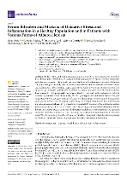Serum Bilirubin and Markers of Oxidative Stress and Inflammation in a Healthy Population and in Patients with Various Forms of Atherosclerosis

Author
Jirásková, Alena
Publication date
2022Published in
AntioxidantsVolume / Issue
11 (11)ISBN / ISSN
ISSN: 2076-3921Metadata
Show full item recordCollections
This publication has a published version with DOI 10.3390/antiox11112118
Abstract
Oxidative stress and inflammation contribute significantly to atherogenesis. We and others have demonstrated that mildly elevated serum bilirubin levels protect against coronary and peripheral atherosclerosis, most likely due to the antioxidant and anti-inflammatory activities of bilirubin. The aim of the present study was to assess serum bilirubin and the markers of oxidative stress and inflammation in both healthy subjects and patients with various forms of atherosclerosis. The study was performed in patients with premature myocardial infarction (n = 129), chronic ischemic heart disease (n = 43), peripheral artery disease (PAD, n = 69), and healthy subjects (n = 225). In all subjects, standard serum biochemistry, UGT1A1 genotypes, total antioxidant status (TAS), and concentrations of various pro- and anti-inflammatory chemokines were determined. Compared to controls, all atherosclerotic groups had significantly lower serum bilirubin and TAS, while having much higher serum high-sensitivity C-reactive protein (hsCRP) and most of the analyzed proinflammatory cytokines (p < 0.05 for all comparisons). Surprisingly, the highest inflammation, and the lowest antioxidant status, together with the lowest serum bilirubin, was observed in PAD patients, and not in premature atherosclerosis. In conclusion, elevated serum bilirubin is positively correlated with TAS, and negatively related to inflammatory markers. Compared to healthy subjects, patients with atherosclerosis have a much higher degree of oxidative stress and inflammation.
Keywords
atherogenesis, atherosclerosis, bilirubin, inflammation, oxidative stress,
Permanent link
https://hdl.handle.net/20.500.14178/1697License
Full text of this result is licensed under: Creative Commons Uveďte původ 4.0 International







